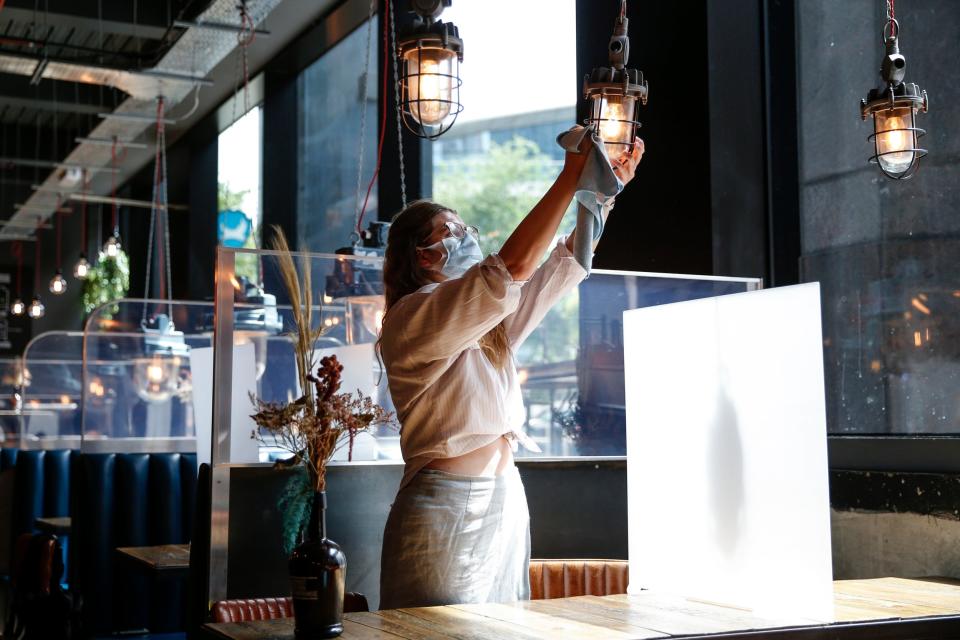If social distancing in pubs works, it may also end sexual harassment of bar staff

The tables are sparkling. The perspex screens gleaming. Al fresco furniture decorates the streets of yawning cities. For three months, the food industry has been trapped in a nightmare. Now bar staff are wiping the sleep from its eyes for the big comeback on “Super Saturday”.
I wish this was a piece about the kaleidoscope of drinks I would soon be enjoying at my favourite bar; the fruity liqueurs, devilish rum soups, and smokey iced blends, purging my tastebuds of the limp supermarket beer that’s sustained me in lockdown.
This is the colourful world that drew me to bartending in my late teens. Summer holidays were spent waitressing at new hipster joints, and when autumn came around I would bartend at busy chain bars through term. Find the right bar, and it is a brave and delicate blend of mood, music and flavours. The best bar is, like a gin martini, a perfect cocktail in itself.
I was taught that just a sniff too much spirit or gomme can murder a drink. Likewise, it takes just one rotter in a room of friends to sour an evening. And despite all the joy it brings, hospitality is a nest of sexual misconduct. When I was waitressing in late-night bars, I would often collect glasses one-handed - one to pick up the glasses, the other hovering around my backside to swat away any “grabbers”.
Almost 90 per cent of female hospitality workers have been sexually harassed at work, including restaurant and cafe staff. And at least one in five women have been sexually assaulted, with disabled women more likely to be abused. Our fear of being touched is now compounded by the knowledge that a harmful virus is still at large. But hospitality staff preparing for this weekend have no choice but to don their best smiles and aprons, and get back to work.
The government’s new “covid-secure” rules include strict table service, partitions and a minimum one-metre distance between tables, registering visitors’ contact details, and permitting only two households to meet at the same time. Punters can also drink outside, and some venues are strengthening these safety measures with more outdoor seats, and reducing staff interaction through apps and digital menus.
Conveniently forgetting that we are the same nation that sardined on Bournemouth beach though, the government assumes that with these new rules in place, we can physically restrain ourselves at a boozer while resuscitating the economy. Call me a cynic, but if my neighbour can’t follow the rules in the Co-op, I’m not holding out hope for the lads at the Kings Arms this weekend.
Anyone who’s ever pulled pints knows how unpredictable pubs and bars can be. Alongside the grabbers, I’ve also had angry customers get uncomfortably close when they felt they weren’t getting served quickly enough. Said customer is also likely to get into fisticuffs with the booth next to theirs, which staff then have to wade into.
The workspace can be small too. Whether you’re mixing a drink, or three of you are hunched over the dishwasher in a steamy back room, these areas are cramped enough for the accidental brush of a hand from a passing colleague.
On and off the bar, we learn how to avoid unwanted attention. We watch how we dress, we go out in groups - these are our own list of rules, because we know that the hard-written ones don’t work. History has taught us firsthand that the laws to protect our bodies will be broken, that we will be touched without being asked, and that alcohol can bring out the worst in all of us. We’re now entering an entirely new arena which women must learn to navigate all over again, in order to feel safe in public.
As we re-enter public life, we do so now with a subjective idea of personal space, carved out by our own unique experiences of the virus. This means that despite the relaxed guidelines, it’s entirely possible that cosying next to a mate on a picnic bench makes them want to crawl back under their duvet and quarantine until Christmas. So, my extroverted hugging types, take note: Out and about, we need to start thinking in terms of “personal spaces” instead. One size no longer fits all.
I am clearly sceptical of the ambitions of the “covid-secure” guidelines, but after seeing the ugly side of hospitality, I welcome the wine and dine haven they hope to create. If all this space policing actually pays off, it shows what can be done when we actually start valuing each others’ bodies. So if it works, I’ll drink to that.
Rebecca Collins is a freelance journalist and cultural critic from Manchester.

